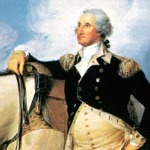Were the Founders Libertarians?
 UPDATED: Asking if the Founders Fathers were libertarians is as meaningful as asking whether the Founders would have preferred Macs or PCs.
UPDATED: Asking if the Founders Fathers were libertarians is as meaningful as asking whether the Founders would have preferred Macs or PCs.
Let me toss in my 5 cents worth on the question of whether the Founders were "libertarians."
This seems to me a question approximately as meaningful as asking whether the Founders would have preferred Macs or PCs: it exports back into the past an entirely alien mental category.
Libertarianism fuses two ideas, one political, one psychological. The political idea is that the central state should be confined within the narrowest possible limits. The psychological idea is that each person should enjoy the widest possible scope to live as he or she thinks best.
Libertarians see these two ideas as very consistent. But that libertarian perspective only feels consistent if you can accept a previous assumption: that the central state is the most important limit on our ability to live as we think best. For most people in most advanced modern democracies, that hypothesis does not ring true. For most people, it's the bill collector, or the ex-wife, or the boss that imposes the most onerous restraints.
If this tandem set of ideas seems remote even in our modern era, back in the 18th century, each on its own would have been inaccessible, never mind both together.
Start for example with the need to confine government. Modern libertarians draw a very clear line between "the state" and private associations. I.e.: If a town council passes an ordinance requiring all houses to be painted white, that's an outrageous violation of personal liberty, but if a condominium association adopts such a rule, that's a reasonable exercise of freedom of association. But suppose you lived in an 18th century New England town, and the town meeting adopted such a rule. Is the town meeting more like the modern town council? Or the condo association?
That distinction, so legible to us, was not nearly so legible in the 18th century. Were the Penn family the "government" of Pennsylvania or its owners? Even at the highest level, things were fuzzy. The king of England was yes clearly equivalent to something we'd call "the state." But Parliament? Was that "the state" also? Or was it more like the U.S. Chamber of Commerce: a permanent standing body to monitor the government and with some ability to protest and block the government's actions?
The fact is that the concept of the "state" as presented in some modern libertarian writing owes much more to 19th century German ideas than to the 18th century Anglo-American legacy. In 18th century Britain, the question of whether ministers owed obedience to the king or to Parliament was a blurry and uncertain one. In 19th century Germany and Austro-Hungary, the question was clear: ministers obeyed the monarch. Period. "The state" as experienced by Ludwig von Mises and Friedrich von Hayek was something outside civil society, something that society could not reliably control, and therefore had to be contained. A John Adams might think of the king of England that way, but that's not how he'd think of the legislature of the commonwealth of Massachusetts.
Click here to read part two.